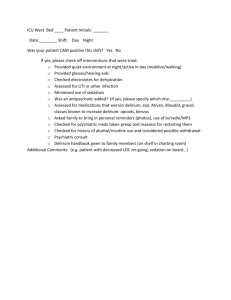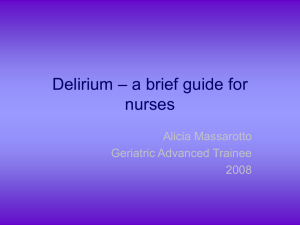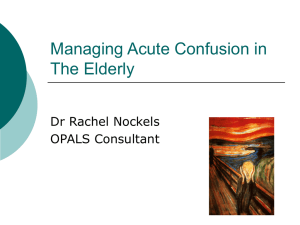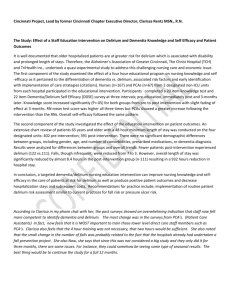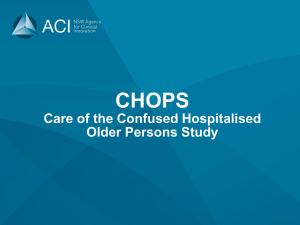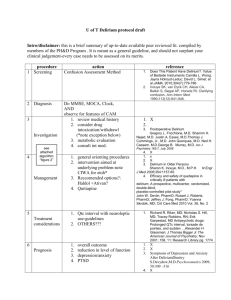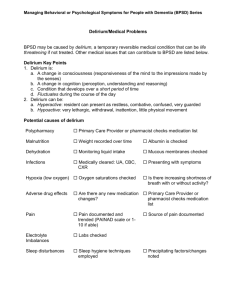Drugs that can cause confusion
advertisement
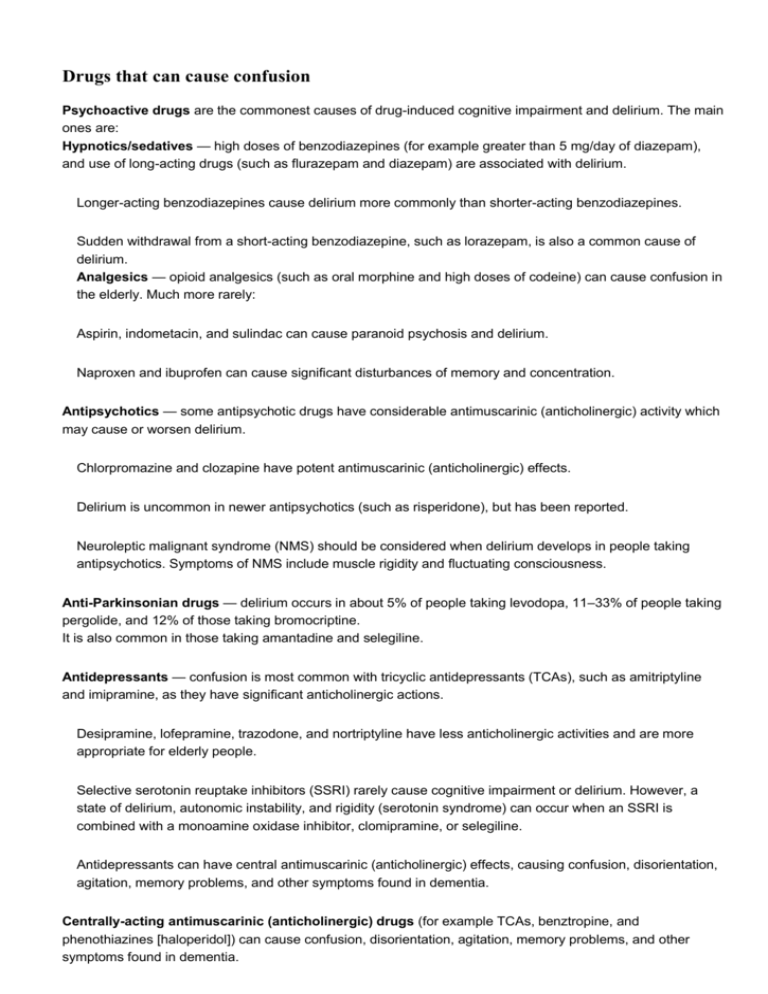
Drugs that can cause confusion Psychoactive drugs are the commonest causes of drug-induced cognitive impairment and delirium. The main ones are: Hypnotics/sedatives — high doses of benzodiazepines (for example greater than 5 mg/day of diazepam), and use of long-acting drugs (such as flurazepam and diazepam) are associated with delirium. Longer-acting benzodiazepines cause delirium more commonly than shorter-acting benzodiazepines. Sudden withdrawal from a short-acting benzodiazepine, such as lorazepam, is also a common cause of delirium. Analgesics — opioid analgesics (such as oral morphine and high doses of codeine) can cause confusion in the elderly. Much more rarely: Aspirin, indometacin, and sulindac can cause paranoid psychosis and delirium. Naproxen and ibuprofen can cause significant disturbances of memory and concentration. Antipsychotics — some antipsychotic drugs have considerable antimuscarinic (anticholinergic) activity which may cause or worsen delirium. Chlorpromazine and clozapine have potent antimuscarinic (anticholinergic) effects. Delirium is uncommon in newer antipsychotics (such as risperidone), but has been reported. Neuroleptic malignant syndrome (NMS) should be considered when delirium develops in people taking antipsychotics. Symptoms of NMS include muscle rigidity and fluctuating consciousness. Anti-Parkinsonian drugs — delirium occurs in about 5% of people taking levodopa, 11–33% of people taking pergolide, and 12% of those taking bromocriptine. It is also common in those taking amantadine and selegiline. Antidepressants — confusion is most common with tricyclic antidepressants (TCAs), such as amitriptyline and imipramine, as they have significant anticholinergic actions. Desipramine, lofepramine, trazodone, and nortriptyline have less anticholinergic activities and are more appropriate for elderly people. Selective serotonin reuptake inhibitors (SSRI) rarely cause cognitive impairment or delirium. However, a state of delirium, autonomic instability, and rigidity (serotonin syndrome) can occur when an SSRI is combined with a monoamine oxidase inhibitor, clomipramine, or selegiline. Antidepressants can have central antimuscarinic (anticholinergic) effects, causing confusion, disorientation, agitation, memory problems, and other symptoms found in dementia. Centrally-acting antimuscarinic (anticholinergic) drugs (for example TCAs, benztropine, and phenothiazines [haloperidol]) can cause confusion, disorientation, agitation, memory problems, and other symptoms found in dementia. Anticonvulsants — all anticonvulsants can impair cognitive function. Maximal cognitive deficits are seen with older anticonvulsants such as phenytoin, primidone, and phenobarbital. Phenytoin has been linked to the development of delirium and dementia.Newer anticonvulsants, such as sodium valproate and carbamazepine, cause mild deficits. Non psychoactive drugs — drug-induced confusion is often peculiar to the individual and the diagnosis is easily missed. Examples include: Antisecretory drugs and mucosal protectants — histamine H2-receptor antagonists (such as cimetidine) have been associated with acute central nervous system (CNS) toxicity, including delirium. This may be due to their anticholinergic effects. Proton pump inhibitors (such as omeprazole) have also been associated with delirium. Cardiac drugs — digoxin can cause cognitive impairment at normal serum levels, as well as with excessive doses. Toxicity in the elderly manifests as CNS symptoms such as delirium. Class 1A antiarrhythmics (such as disopyramide, quinidine, and procainamide) have significant anticholinergic effects and can cause delirium. Calcium antagonists, angiotensin-converting enzyme (ACE) inhibitors, and amiodarone can cause idiosyncratic episodes of delirium. Methyldopa has been reported to cause impaired mental functioning and delirium. Some beta blockers, including topical timolol, have been reported to cause chronic cognitive impairment and pseudodementia. Corticosteroids — chronic cognitive impairment, and deficits in attention, concentration, and memory, as well as delirium has been reported with corticosteroids. Psychiatric disturbance is dose-related (the greater the dose, the greater the effects). Antibiotics — there have been numerous cases of delirium following treatment with penicillins, cephalosporins, and quinolones. Inhibition of GABA (gamma-aminobutyric acid) neurotransmitters has been implicated as a mechanism for delirium caused by fluoroquinolones and penicillins. Drug interactions and toxicity — concomitant medications increase the chances of drug interactions and drug-induced confusion. In elderly people, drugs may be metabolized and excreted more slowly and their distribution in the various body compartments can change. Therefore, CNS toxicity can occur with normal doses or within the normal therapeutic plasma levels of drugs, and present as dementia or delirium.
